It looks like you're using an Ad Blocker.
Please white-list or disable AboveTopSecret.com in your ad-blocking tool.
Thank you.
Some features of ATS will be disabled while you continue to use an ad-blocker.
share:
originally posted by: Justoneman
originally posted by: F2d5thCavv2
a reply to: crankyoldman
Re: Swalwell. Pretty funny coming from a traitor who sleeps with enemy spies.
Cheers
Treasonous with no class to fart in public like some kind of entitled asshat.
Jom,
I fear that will those kind of entitled NPCs will be much more commonly encountered in the near future.
Cheers
Activist investor arrested at shareholder meeting after slamming Warren Buffett's funding for Bill Gates' woke philanthropy and ties to pedophile
Jeffrey Epstein
www.dailymail.co.uk...
YouTube
JPMorgan Workers Flagged Epstein and ‘Girls Gone Wild’ Charges to Bosses
www.thedailybeast.com...
Dimon pressed on reports that JPMorgan ignored Epstein’s sex trafficking
www.google.com...
An activist investor was arrested at a shareholder meeting after slamming Bill Gates' 'woke' philanthropy and meetings with Jeffrey Epstein.
Peter Flaherty, chairman of conservative NGO the National Legal and Policy Center, was cut off by Warren Buffet while speaking in favor of a proposal to have the business mogul removed as chairman of Berkshire Hathaway.
Flaherty condemned Buffet's funding of the Bill and Melinda Gates Foundation before highlighting links between the Microsoft founder and Epstein.
The shareholder had his mic cut halfway through his allotted three-minute time slot before being arrested and dragged out of the venue.
Flaherty, who has regularly confronted bosses of America's largest corporations, later decried his unprecedented arrest and said Buffet had 'no right to silence me'.
www.dailymail.co.uk...
YouTube
JPMorgan Workers Flagged Epstein and ‘Girls Gone Wild’ Charges to Bosses
JPMorgan raised red flags about its banking relationship with Jeffrey Epstein as early as 2006 and held meetings with former executive Jes Staley—who is accused of sexually abusing at least one woman in Epstein’s orbit—about his friendship with the multimillionaire sex-trafficker, new court exhibits reveal.
According to internal emails published as exhibits as part of an Epstein victim’s lawsuit against JPMorgan, Staley even went as far as suggesting that bank brass meet with Ken Starr, Epstein’s high-powered lawyer who helped him dodge serious charges in Florida. (Starr is most known as the independent counsel who investigated President Bill Clinton’s sexual misconduct and whose probe led to his impeachment.)
www.thedailybeast.com...
Dimon pressed on reports that JPMorgan ignored Epstein’s sex trafficking
JPMorgan Chase CEO Jamie Dimon is being asked to provide more information about recent reports that the company ignored convicted offender Jeffrey Epstein’s sex trafficking background.
Sen. Tina Smith (D-Minn.) sent a letter to Dimon on Wednesday raising her concerns about recent reports and court filings that have described JPMorgan Chase’s “ties to indicted sex trafficker Jeffrey Epstein.” She said that the allegations included accusing the bank of ignoring “obvious signs of Epstein’s illegal activity” and keeping a relationship with him.
www.google.com...
DeepMind founder says governments need to compensate 'serious number of losers' who will be left jobless due to AI
www.businessinsider.com...
www.google.com... -solution-for-people-that-lose-their-jobs/amp/
A co-founder of DeepMind, the AI company bought by Google in 2014, warned about AI-related job losses.
Mustafa Suleyman said at a San Francisco conference that there will be "a serious number of losers."
He said that universal basic income could be the answer.
www.businessinsider.com...
In March, Goldman Sachs argued generative A.I. that can create content almost indistinguishable from a human, like Midjourney and ChatGPT, could leave 300 million full-time workers across the U.S. and Europe out of a job.
Just how many people could also be made extremely poor is the real question that could prove explosive—particularly for the two countries that DeepMind effectively calls home: the U.K. and the United States.
Should tens of millions of knowledge sector workers or more lose their job through generative A.I., without any real plan to cushion the blow, the resulting upheaval could prove significantly disruptive.
“There are going to be a serious number of losers [that] will be very unhappy, very agitated,” warned Suleyman.
www.google.com... -solution-for-people-that-lose-their-jobs/amp/
Visa uses CBDC for programmable finance prototype for farmers
www.finextra.com...
The payments giant teamed up with Microsoft, Agrotoken and Sinqia to develop its submission; a programmable finance platform for SMEs, particularly farmers, that is designed to enable greater access to global capital markets, facilitate interoperability between currencies, improve operational processes, and uncover new growth opportunities.
Catherine Gu, global head, CBDC, Visa, says: "By contributing our expertise, scale, network, and cutting-edge technologies in this market, we are able to help advance real-world applications of digital currencies — in this case making it possible for a soybean farmer to create and globally auction a tokenized contract on a permissioned version of the Ethereum blockchain, while utilizing different forms of money and interoperating between them.”
The programmable aspects of digital currencies, which allow delivery and payment of assets and currencies to be automatically settled only when certain conditions are met, open the door for more efficient capital usage and reduced counterparty risks, while leveraging the security, stability, and safety of a central bank liability via CBDC as a reliable settlement currency, says Visa.
www.finextra.com...
It's actually pretty good.
edit on 10-5-2023 by FlyingFox because: (no reason given)
Behavior Panel
edit on 10-5-2023 by FlyingFox because: (no reason given)
originally posted by: Guyfriday
a reply to: crankyoldman
geeshs, standing by for major FF at this point. Wait till it gets exposed that Romney and Pelosi were taking a piece of that pie as well.
Dems and RINO's I keep saying are going to have to go or we lose our freedoms forever that we have been fighting to give to others world wide.
Off to plan "B".
From: MSN News
Grassley promised a Plan "B" if the DoJ refused to hand over those documents. So what's Plan "B"?
Also where the Frick-Frack is -Q-. I think the next thread in the -Q-Series should be named "-Q- is dead" since that's what it seems like at this point.
As a side, wouldn't it be funny if Grassley came out in a presser and declared that he is -Q-.
added in video from Wray testifying in front of congress for money:
Spoiler alert:
It's not our job, says FBI head (this is a very gross paraphrasing)
From: MSN News
WASHINGTON — The FBI has refused to hand over an informant file alleging that President Biden took bribes while he was vice president, The Post has learned.
House Oversight Committee Chairman James Comer (R-Ky.) issued a legally binding subpoena last week requiring the FBI to turn over the file by noon Wednesday.
Sen. Chuck Grassley (R-Iowa), who passed a whistleblower’s tip about the document to Comer, said the FBI did not comply with the writ.
“They didn’t give us the unclassified document. They sent us a five or six-page letter that I haven’t studied thoroughly yet,” Grassley told The Post.
“They didn’t dispute that it exists — that the document exists or that it is unclassified … why they haven’t given it, I don’t know.”
Grassley promised a Plan "B" if the DoJ refused to hand over those documents. So what's Plan "B"?
Also where the Frick-Frack is -Q-. I think the next thread in the -Q-Series should be named "-Q- is dead" since that's what it seems like at this point.
As a side, wouldn't it be funny if Grassley came out in a presser and declared that he is -Q-.
added in video from Wray testifying in front of congress for money:
Spoiler alert:
It's not our job, says FBI head (this is a very gross paraphrasing)
edit on 10-5-2023 by Guyfriday because: (no reason given)
This was passed last month:
US digital identity bill passes through to Senate
US poised for national digital ID rollout
www.globalgovernmentforum.com...
Utah makes progress on digital IDs for citizens, with blockchain technology as a bonus
www.sltrib.com...
From Central Asia to the world: Digitalization drive pushes new biometric startups
www.biometricupdate.com...
US digital identity bill passes through to Senate
The legislation behind the task force, known as the Improving Digital Identity Act, was passed by the US Senate Homeland Security and Governmental Affairs Committee last week in a vote of 11-1. It now moves on to the full Senate for debate
The inadequacy of current digital identity solutions degrades security and privacy for all people in the United States, and next generation solutions are needed that improve security, privacy, equity, and accessibility,” the bill reads.
It says the government is “uniquely positioned to deliver critical components that address deficiencies in the digital identity infrastructure of the United States and augment private sector digital identity and authentication solutions”.
The legislation’s passage joins nearly two dozen critical cyber bill approvals, including the bipartisan Securing Open Source Software Act, which would legally bind the federal government to protecting open-source software like ChatGPT.
US poised for national digital ID rollout
The passing of the Improving Digital Identity Act to the next stage of debate follows the leak in February of the draft terms of a draft executive order which outlined that the US federal government’s Login .gov digital identity service could be expanded nationally.
www.globalgovernmentforum.com...
Utah makes progress on digital IDs for citizens, with blockchain technology as a bonus
Utah just took a momentous step towards bringing paper-based government services into the 21st century. Over the next few months, the Beehive State will conduct a first-in-the-nation pilot program to examine the feasibility of a digital ID system utilizing blockchain technologies. As more states begin to recognize the importance of modernizing public services, they should emulate Utah’s approach of cautious optimism.
www.sltrib.com...
From Central Asia to the world: Digitalization drive pushes new biometric startups
Nestled between large countries such as India, China and Russia, Central Asia has long suffered from poor connections — both physically and digitally. But over the past years, the region has been investing in its digital infrastructure, including its biometric industry with startups now expanding across the world
In 2020, the National Bank of Kazakhstan launched a remote biometric identification service allowing citizens to access commercial financial services. The launch allowed banks to open accounts remotely for crediting social benefits during the pandemic. About 2.5 million Kazakh citizens can now access over 400 public services through the eGov Mobile application only using biometrics.
Biometric technologies have also become widespread in the banking sector. With the help of the business sector, the country has moved towards a cashless economy, with more than 74 percent of transactions now being cashless.
More investment into digital services may come from global players: While China is expanding its presence with its Digital Silk Road strategy, the European Union has been promoting digital cooperation through the EU-Central Asia Digital Connectivity initiative. The World Bank has been working on digital infrastructure through its Digital CASA Regional Program and the Eurasian Economic Union (EAEU) is carrying out its Digital Agenda until 2025.
www.biometricupdate.com...
Very Interesting CLIP
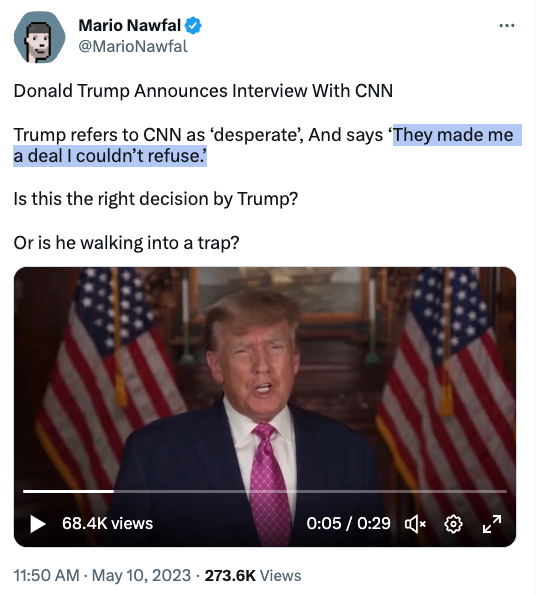
Q Godfather
These go together and are rather important. Tether BTC Ponzi is being unwound, not so much crashed to create chaos, which is helpful but the issue still looms large.
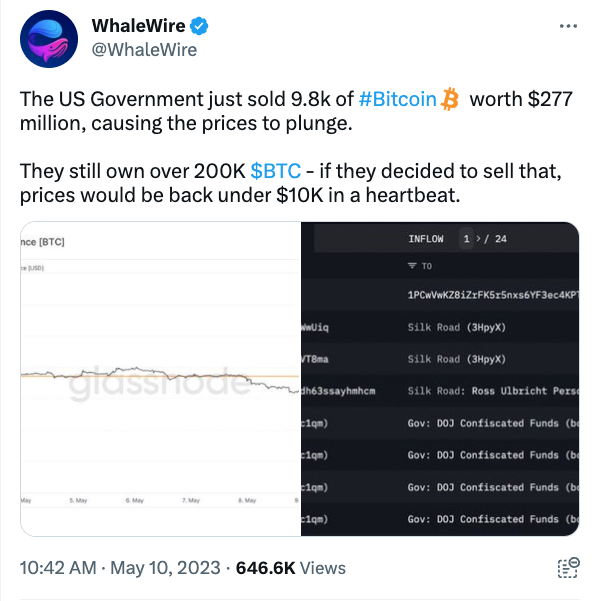
Thread
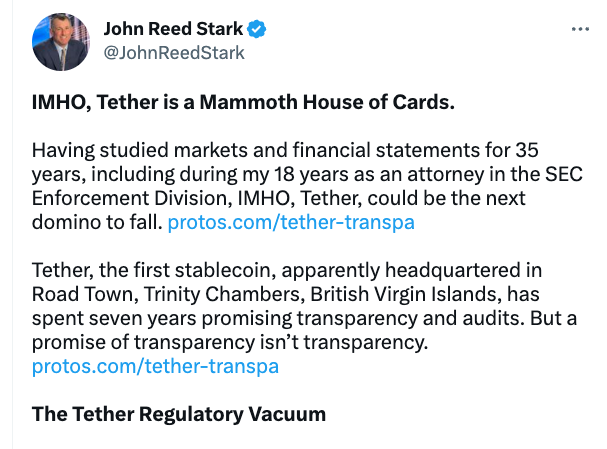
The laundering side of things must go boom, we explored that pretty deeply here over the years.
Very Interesting CLIP
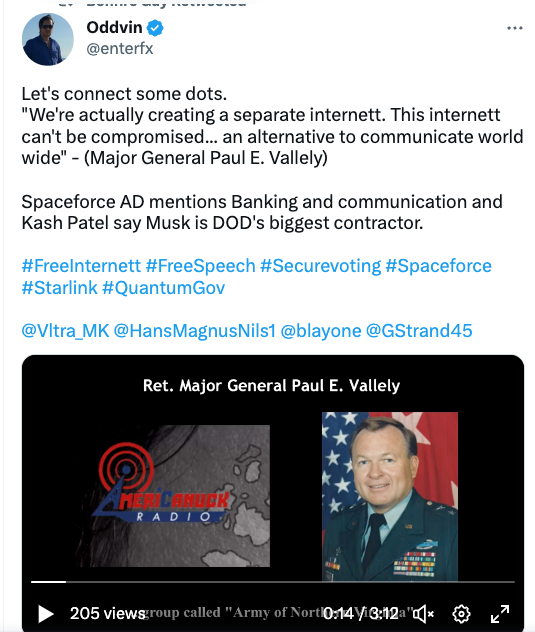

Q Godfather
These go together and are rather important. Tether BTC Ponzi is being unwound, not so much crashed to create chaos, which is helpful but the issue still looms large.

Thread

The laundering side of things must go boom, we explored that pretty deeply here over the years.
Very Interesting CLIP

edit on 10-5-2023 by crankyoldman because: (no reason given)
edit on 10-5-2023 by crankyoldman because: (no reason
given)
A Lot More Bodies Coming” – Druckenmiller Warns Of “Hard Landing”, Blasts Fed “Free Money” Making People Do “Really Stupid
Things”
www.nxtmine.com... id-things/
Deposits at JPMorgan Chase, Bank of America and Wells Fargo Shrank by $465 Billion Y-O-Y; More than Twice the Total of 4,000 Small Banks
wallstreetonparade.com... -total-of-4000-small-banks/
Stan Druckenmiller thinks the US economy is teetering on the edge of a recession, predicting a “hard landing”, and warning that “there’s a lot more bodies coming” with regarding regional banks and corporate bankruptcies.
He also criticized US fiscal policy.
“We wasted all our bullets” in an economic expansion, he said, worrying about the fiscal situation.
“It’s a scary cocktail that we’re being presented with.”
www.nxtmine.com... id-things/
Deposits at JPMorgan Chase, Bank of America and Wells Fargo Shrank by $465 Billion Y-O-Y; More than Twice the Total of 4,000 Small Banks
Since the banking crisis began making headlines at expensive media real estate, the narrative has been that deposits are fleeing the small commercial banks and flooding into the biggest banks that are perceived as too-big-to-fail and thus offer a safer venue for deposits.
Because these mega banks are the same ones that the Fed has been bailing out since the financial crisis of 2008, that narrative requires believing that our fellow Americans are dumber than a stump.
The three largest banks in the U.S., as measured by deposits, are JPMorgan Chase, Bank of America and Wells Fargo. Between April 27, 2022 and April 26, 2023, JPMorgan Chase lost $184 billion in deposits; Bank of America lost $162 billion; and Wells Fargo lost $118.7 billion, for a combined loss in deposits of $464.7 billion — representing 72 percent of the decline in deposits at the 25 largest banks. (That’s a crystal clear indication of just how dangerously concentrated banking has become in the U.S.)
The deposit losses at JPMorgan Chase, Bank of America and Wells Fargo are more than twice what the 4,000 small banks lost in total during the same period. Their combined loss in deposits was just $210 billion.
wallstreetonparade.com... -total-of-4000-small-banks/
Yellen is calling CEOs personally to warn on US debt ceiling, sources say
www.google.com...
Jerome Powell Faces Lowest Public Confidence for Fed Chairman on Record, Gallup Says
www.bloomberg.com...
Yellen is reaching out to leaders in the financial sector to alert them of the "dangerous consequences of the current brinkmanship," according to a Monday report by Reuters, who cited two unnamed sources familiar with the matter.
And although the sources didn't reveal to Reuters her purpose for the calls, officials from US President Joe Biden's administration have reportedly been in talks with business executives about pushing Republicans to raise the US debt ceiling without conditions.
www.google.com...
Jerome Powell Faces Lowest Public Confidence for Fed Chairman on Record, Gallup Says
Public confidence in Jerome Powell’s leadership of the Federal Reserve has dropped precipitously, according to a new survey, and is now at or below his predecessors’ as the central bank wages its war against inflation.
A Gallup poll released Tuesday shows 36% of US adults say they have a “great deal” or a “fair amount” of confidence that the Federal Reserve chairman would do or recommend the right thing for the economy.
www.bloomberg.com...
a reply to: crankyoldman
cranky, I just found this post from L♾P on telegram... We've previously linked this account to Mr Pool.

Bigger
It gives me resonances with your coded pictures from a while back... any comments on this?
In particular the following resonates for me:
COLORS
GEOMETRIC CIRCLES
cranky, I just found this post from L♾P on telegram... We've previously linked this account to Mr Pool.

Bigger
It gives me resonances with your coded pictures from a while back... any comments on this?
In particular the following resonates for me:
COLORS
GEOMETRIC CIRCLES
Odd Elon Musk tweet at 4:52 am UTC:

Gematria is interesting:
THERE IS NO MEME I LOVE YOU =
VERY VERY VERY SOON
LIGHT AT THE END OF THE TUNNEL
GESARA GOD ECONOMIC SECURITY ACCREDITED REFORM ACT
AMERICAN CIVIL WAR
A NEW DAWN
GIVER OF WEALTH
FIRST WAVE

Gematria is interesting:
THERE IS NO MEME I LOVE YOU =
VERY VERY VERY SOON
LIGHT AT THE END OF THE TUNNEL
GESARA GOD ECONOMIC SECURITY ACCREDITED REFORM ACT
AMERICAN CIVIL WAR
A NEW DAWN
GIVER OF WEALTH
FIRST WAVE
edit on 10-5-2023 by RelSciHistItSufi because: (no reason given)
a reply to: FlyingFox
Why did Gen. Vallely spell internet with 2xTs, Twice!
Gematria for INTERNETT
I guess there is also the implication of NETT meaning after taxes; not GROSS.
Why did Gen. Vallely spell internet with 2xTs, Twice!
Gematria for INTERNETT
I guess there is also the implication of NETT meaning after taxes; not GROSS.
edit on 10-5-2023 by RelSciHistItSufi because: (no reason
given)
As they used to say, "the notices are in" (do people even know what that means anymore?) and this sums it up.
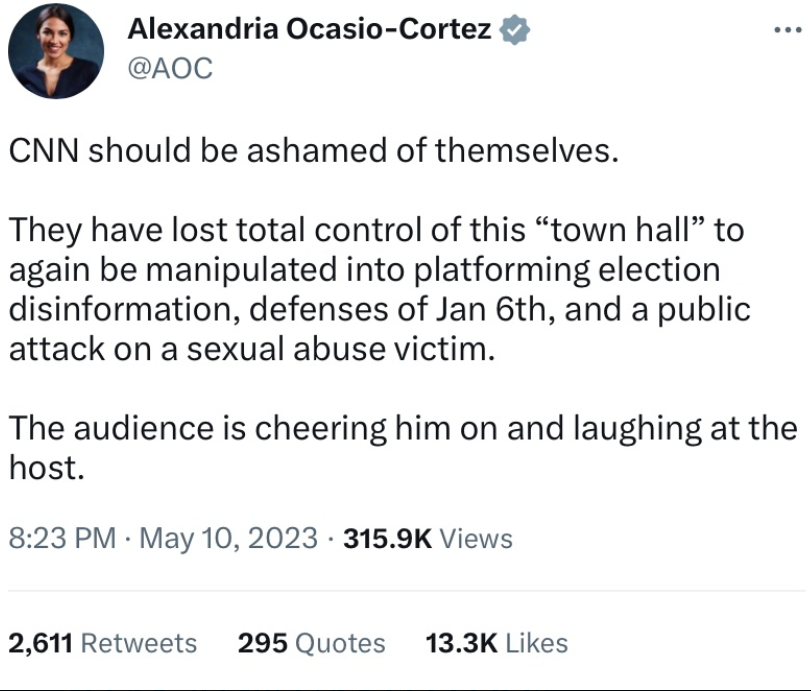
He's a effing force of nature. "Arrested" EJeanBOT CNN and boom, crushes it.
Beattie on: In a serious country Kaitlin Collins would be serving cocktails at a second rate casino Well, in some metaphorical sense that's what she is doing at CNN...
Key Takeaway...
HOME RUN + DUNK
Thread and Clips Nothing really new here, but is enjoyable watching smug AMA ghoul Dr. Drew get his face shoved into dog feces by a BlackRock guy who knows stats, numbers, and how to put them together.


He's a effing force of nature. "Arrested" EJeanBOT CNN and boom, crushes it.
Beattie on: In a serious country Kaitlin Collins would be serving cocktails at a second rate casino Well, in some metaphorical sense that's what she is doing at CNN...
Key Takeaway...
CNN: "Do you want Ukraine to win this war?"
Trump: "I don't think in terms of winning and losing, I think in terms of getting it settled, so we stop killing all these people...
HOME RUN + DUNK
Thread and Clips Nothing really new here, but is enjoyable watching smug AMA ghoul Dr. Drew get his face shoved into dog feces by a BlackRock guy who knows stats, numbers, and how to put them together.

edit on 10-5-2023 by crankyoldman because: (no reason given)
Here's the CNN Town Hall highlights from The Guardian...
www.theguardian.com...
guardian.com/us-news/live/2023/may/10/trump-town-hall-cnn-republicans-live-updates
www.theguardian.com...
guardian.com/us-news/live/2023/may/10/trump-town-hall-cnn-republicans-live-updates
new topics
-
Ukraine halts transit of Russian gas to Europe after a prewar deal expired
Political Conspiracies: 49 minutes ago -
Welp...Happy New Year!!
General Chit Chat: 2 hours ago -
Vehicle Strikes people in New Orleans
Mainstream News: 4 hours ago -
The Hand that Rocks the Cradle - Labour Plans “diversities of our society” Curriculum Change
Regional Politics: 4 hours ago
top topics
-
Vehicle Strikes people in New Orleans
Mainstream News: 4 hours ago, 12 flags -
SCOTUS Chief Justice JOHN ROBERTS Ends 2024 Describing His Fears for Safety of U.S. Judges.
Above Politics: 13 hours ago, 4 flags -
The Hand that Rocks the Cradle - Labour Plans “diversities of our society” Curriculum Change
Regional Politics: 4 hours ago, 4 flags -
Welp...Happy New Year!!
General Chit Chat: 2 hours ago, 3 flags -
Ukraine halts transit of Russian gas to Europe after a prewar deal expired
Political Conspiracies: 49 minutes ago, 2 flags
active topics
-
Ukraine halts transit of Russian gas to Europe after a prewar deal expired
Political Conspiracies • 15 • : SteamyAmerican -
How we've changed in 100 years
Ancient & Lost Civilizations • 16 • : SprocketUK -
Vehicle Strikes people in New Orleans
Mainstream News • 29 • : BeyondKnowledge3 -
The C.D.C. Says There Was NO INFLUENZA Worth Reporting for the 2020-2021 Flu Season.
Diseases and Pandemics • 83 • : BedevereTheWise -
‘Something horrible’: Somerset pit reveals bronze age cannibalism
Ancient & Lost Civilizations • 41 • : Xtrozero -
The Hand that Rocks the Cradle - Labour Plans “diversities of our society” Curriculum Change
Regional Politics • 11 • : angelchemuel -
Simulation theory and have we reset before like a game?
Conspiracies in Religions • 39 • : Xtrozero -
Welp...Happy New Year!!
General Chit Chat • 6 • : Flyingclaydisk -
SCOTUS Chief Justice JOHN ROBERTS Ends 2024 Describing His Fears for Safety of U.S. Judges.
Above Politics • 9 • : VictorVonDoom -
New UK Petition - Close the borders! Suspend ALL immigration for 5 years!
Regional Politics • 18 • : Freeborn

